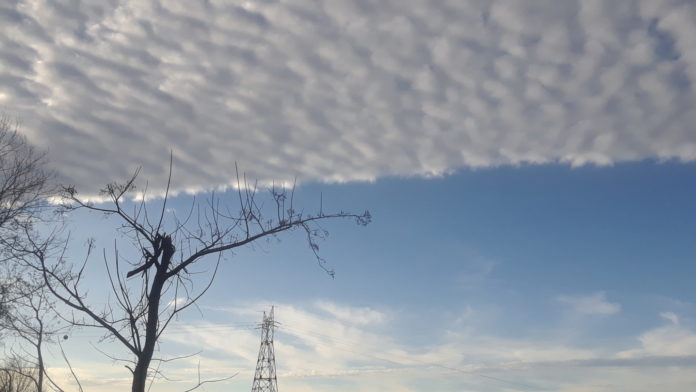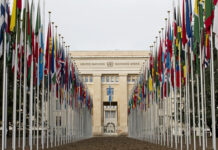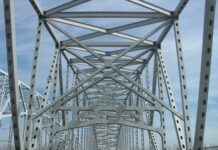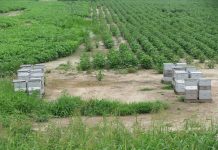Photo credit: DiasporaEngager (www.DiasporaEngager.com).
Azerbaijan is making the most of its hosting of the UN climate summit (COP29) in November this year. Its president, Ilham Aliyev, has been on a whirlwind tour of the world to court major nations for a climate finance pact that will feature Baku’s initiative on a New Collective Quantified Goal (NCQG), which originally was a pledge to provide $100 billion annually for climate action in developing countries. He also enlisted the support of his neighbor, Russia.
On August 18-19, Russian President Vladimir Putin made a two-day state visit to Azerbaijan. Aliyev invited him to attend COP29. Putin hasn’t been fond of climate summits, but this one will be hard for him to skip. If he attends, he will, for the first time since the invasion of Ukraine, sit next to leaders of P5, G-7, BRICS (Brazil, Russia, India, China, and South Africa), G-20, and the 38-member OECD (Organization of Economic Cooperation and Development) countries. Except for G-7, Russia is a key member of all these groupings.
Putin will be tempted to support the NCQG, since it would give him an opportunity to name and shame those who have been historically the world’s largest emitters of greenhouse gases (GHG). But there is an irony involved here. The Russian economy is awash in resource extraction, especially the extraction of oil and natural gas. Russia is world’s fourth largest emitter of greenhouse gasses, after China, the United States, and India. Should Russia call out rich nations for their historical contribution to GHG emissions, it will be the pot calling the kettle black.
Besides their shared past as former Soviet republics, Azerbaijan and Russia are fellow littoral states that share the long, transnational Caspian coastline. With a surface area of 143,000 square miles, the Caspian is the world’s largest inland body of water. It is “inland” because it doesn’t feed into any larger waterway, such as the ocean. Its year-round cumulative moisture makes coastal economies hum.
As one of the five littoral states—the others being Kazakhstan, Russia, Iran, and Turkmenistan—Azerbaijan is the most dependent upon the Caspian. One-fourth of Baku’s oil reserves are located offshore in the Caspian. Azerbaijan could live without this oil, but it cannot live without the food, water, and ecological treasures that the Caspian lavishes upon it. Sturgeon is the queen fish of the Caspian, which yields the world delicacy of caviar. Up to 90 percent of the world’s caviar is sourced from the Caspian. Baku, the capital city of Azerbaijan and host to COP29, is built on the shore of the Caspian. The lake is the city’s water tower and its food pantry.
But the Caspian is fast drying up. With climate-induced soaring temperatures, the lake is rapidly evaporating, leaving behind sprawling patches of dry land. On average, the Caspian has been receding by 20 centimeters per year. It is projected to drop by 18 meters by the end of the century, while the northern Caspian is already only 5-6 meters deep. It has now passed below the level at which it can support the marine ecosystem.
Aliyev showed Putin rocks that were peeking out of the lake’s fast developing shallows. The Azeri leader fears that this process will eventually turn the lake into an island, just as it did to the Aral Sea. The latter’s seabed is now land surface with miles upon miles of dirt trails. The Kazakh port city of Aqtau has already dried up, leaving the vibrant urban center and its economy in ruin.
At slightly over a million square miles, Kazakhstan is comparable in size to Western Europe and thus can absorb the loss of a city. Azerbaijan is, however, far more compact with a land area of just 33,436 square miles. Its surface and subsurface territorial waters in the Caspian are twice as large as its landmass. Losing so much of the country to climate change would be unthinkable for any Azeri.
Putin has promised Aliyev to save the lake. Despite his promise, there is little Putin can do. Putin’s Russia is an upstream country on the Caspian. The other four coastal nations, including Azerbaijan, want Moscow to cease impounding and diverting tributaries to the Caspian. One such tributary is the Volga River, which is the longest and the largest (in volume) body of water on the European continent. The Volga’s headwaters are located northwest of Moscow. Caspian nations argue that the Volga makes up 80 percent of the inflow to the lake. The remainder (20 per cent) comes from two downstream river systems: the Kurra and the Aras. The Volga’s uninterrupted flow is, therefore, critical to the life of the Caspian.
But Russia has built 40 dams and diversions on the Volga, and 18 more are in various stages of development, all of which have slashed flow to the Caspian to a trickle. Dams and diversions do diminish inflows, but climate change too is having an impact. If the Caspian itself is evaporating from hotter and drier conditions, the Volga is no exception to this phenomenon either. Reduced precipitation is contributing to the problem. A case in point is the transboundary Helmand River that drains both Afghanistan and Iran. Lack of rainfall has reduced the Helmand’s flow so much that it seldom makes it to Iran, inflaming tensions between Kabul and Tehran.
Ironically, all five Caspian economies – Azerbaijan, Iran, Kazakhstan, Russia, and Turkmenistan — are heavily dependent on fossil fuel production, which is at the heart of climate breakdown. Despite platitudes about reaching net zero, the global capitalist economy is also hooked on fossil fuels. As a result, carbon emissions are on the rise, and atmospheric temperatures are smashing records. Since the Paris Climate Pact in 2015, the world has gone backward on climate change.
Unless hydrocarbon resources are kept in the ground, there is little hope of saving world monuments such as the Caspian. COP 29 is a great occasion to showcase what the Caspian means to the region and the rest of the world. Azerbaijan’s initiative on climate finance couldn’t be more urgent to help preserve the Caspian and similar natural wonders. The United States will better serve the cause of climate stability by taking the lead in supporting the NCQG. President Joe Biden could further burnish his climate legacy by giving his vision at COP 29 of the “Great Transition” to a global green economy. Biden and others need to go well beyond the business as usual of climate adaptation to strike at the root of the problem: fossil capitalism.
Source of original article: Foreign Policy In Focus (fpif.org).
The content of this article does not necessarily reflect the views or opinion of Global Diaspora News (www.GlobalDiasporaNews.com).
To submit your press release: (https://www.GlobalDiasporaNews.com/pr).
To advertise on Global Diaspora News: (www.GlobalDiasporaNews.com/ads).
Sign up to Global Diaspora News newsletter (https://www.GlobalDiasporaNews.com/newsletter/) to start receiving updates and opportunities directly in your email inbox for free.






























